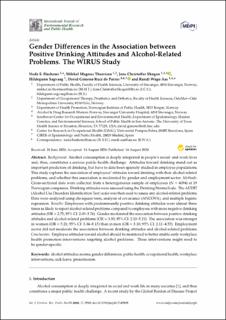| dc.contributor.author | Hashemi, Neda | |
| dc.contributor.author | Thørrisen, Mikkel Magnus | |
| dc.contributor.author | Skogen, Jens Christoffer | |
| dc.contributor.author | Sagvaag, Hildegunn | |
| dc.contributor.author | de Porras, David Gimeno Ruiz | |
| dc.contributor.author | Aas, Randi Wågø | |
| dc.date.accessioned | 2023-01-12T09:12:10Z | |
| dc.date.available | 2023-01-12T09:12:10Z | |
| dc.date.created | 2020-08-18T09:04:44Z | |
| dc.date.issued | 2020 | |
| dc.identifier.citation | Hashemi, N. S., Thørrisen, M. M., Skogen, J. C., Sagvaag, H., Gimeno Ruiz de Porras, D., & Aas, R. W. (2020). Gender differences in the association between positive drinking attitudes and alcohol-related problems. the WIRUS study. International journal of environmental research and public health, 17(16), 5949. | en_US |
| dc.identifier.issn | 1660-4601 | |
| dc.identifier.uri | https://hdl.handle.net/11250/3042898 | |
| dc.description.abstract | BACKGROUND: Alcohol consumption is deeply integrated in people’s social- and work lives and, thus, constitutes a serious public health challenge. Attitudes toward drinking stand out as important predictors of drinking, but have to date been sparsely studied in employee populations. This study explores the association of employees’ attitudes toward drinking with their alcohol-related problems, and whether this association is moderated by gender and employment sector. METHODS: Cross-sectional data were collected from a heterogeneous sample of employees (N = 4094) at 19 Norwegian companies. Drinking attitudes were assessed using the Drinking Norms Scale. The AUDIT (Alcohol Use Disorders Identification Test) scale was then used to assess any alcohol-related problems. Data were analyzed using chi-square tests, analysis of covariance (ANCOVA), and multiple logistic regression. RESULTS: Employees with predominantly positive drinking attitudes were almost three times as likely to report alcohol-related problems compared to employees with more negative drinking attitudes (OR = 2.75; 95% CI: 2.00–3.76). Gender moderated the association between positive drinking attitudes and alcohol-related problems (OR = 3.30; 95% CI: 2.10–5.21). The association was stronger in women (OR = 5.21; 95% CI: 3.34–8.15) than in men (OR = 3.10; 95% CI: 2.11–4.55). Employment sector did not moderate the association between drinking attitudes and alcohol-related problems. CONCLUSIONS: Employee attitudes toward alcohol should be monitored to better enable early workplace health promotion interventions targeting alcohol problems. These interventions might need to be gender-specific. | en_US |
| dc.language.iso | eng | en_US |
| dc.publisher | MDPI | en_US |
| dc.relation.uri | https://www.mdpi.com/1660-4601/17/16/5949/pdf | |
| dc.rights | Navngivelse 4.0 Internasjonal | * |
| dc.rights.uri | http://creativecommons.org/licenses/by/4.0/deed.no | * |
| dc.title | Gender differences in the association between positive drinking attitudes and alcohol-related problems. The WIRUS study | en_US |
| dc.type | Peer reviewed | en_US |
| dc.type | Journal article | en_US |
| dc.description.version | publishedVersion | en_US |
| dc.rights.holder | the authors | en_US |
| dc.subject.nsi | VDP::Medisinske Fag: 700 | en_US |
| dc.source.volume | 17 | en_US |
| dc.source.journal | International Journal of Environmental Research and Public Health | en_US |
| dc.source.issue | 16 | en_US |
| dc.identifier.doi | 10.3390/ijerph17165949 | |
| dc.identifier.cristin | 1823743 | |
| dc.relation.project | Norges forskningsråd: 260640 | en_US |
| dc.source.articlenumber | 5949 | en_US |
| cristin.ispublished | true | |
| cristin.fulltext | original | |
| cristin.qualitycode | 1 | |

